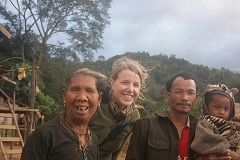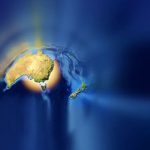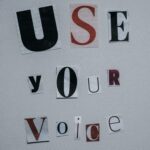Promoting literacy in Laos

There are many different ways that you can make a difference to a community overseas. Karlee Taylor shares her experience promoting creative literacy in Laos.
Laos, green but quickly changing, punctuated with stunning karst and mountain landscape, scattered with rural communities and unique cultural groups. I came to the largest and most diverse natural forest area in the country, the Nakai Nam Theun National Protected Area to help develop and establish an ecotourism model, placing a value on living wildlife and providing an alternative livelihood option to local villagers.
Three of the last five large mammals to be discovered or re-discovered world-wide occur here in Nakai Nam Theun, also home to over 430 bird species and representing internationally significant habitat for four threatened primate species including the Endangered Red Shanked Douc (Pygathrix nemaeus) and Endangered Southern White Cheeked Gibbon (Nomascus siki). Nakai Nam Theun National Protected Area is the core of a number of connected conservation areas along the Lao-Vietnam border, which together form one of the last remaining biodiversity corridors in South East Asia and the most important protected area in the Lao-Cambodia-Vietnam Region.
Walking under the thick canopy of the rich, dipterocarp forest, recognising something of myself in a Red Shanked Douc and waking in my hammock to the rising song of the gibbons, I don’t need to be reminded how lucky I am to be working towards this project, even if at times it feels unachievable.

By far the most valuable initiative I have worked towards has been a creative literacy project run with the help of friends, family and a preschool in South Australia. It has provided my Host Organisation, the Nam Theun 2 Watershed Management and Protection Authority, and local partners an example of how they can provide access to books in a fun, engaging manner and has helped build the capacity of teachers to promote creative literacy and use books in their everyday teaching of the curriculum.
One of the Millennium Development Goals, which Australian Volunteer Programs work towards, is achieving universal primary education for all children by 2015. According to UNESCO EFA Global Monitoring Report (2011), if all students in low-income countries left primary school with basic reading skills, “171 million people could be lifted out of poverty”. This is equivalent to a 12 per cent drop in world poverty.
These books are providing not only students but all villagers with the opportunity for self-directed learning, to realise their full potential and contribute to their communities more effectively.
People are extraordinarily capable of directing their own development if given the opportunity to do so. This is a worthy consideration those thinking about "voluntourism‟ (tourism to participate in activities to further a charitable cause, payed for by the traveller) should take into account. How much value will painting the wall of the orphanage for the tenth time have to that community in the long run?
My experience with Australian Volunteers for International Development, an Australian Government, AusAID initiative, has allowed me to see opportunities where I can enable others in their own development. The Australian Volunteers program deploys skilled volunteers to live and work in developing countries as part of the government‟s overseas aid program. I have been lucky enough to become a part of the local community and really begin to understand Lao culture.
This started out as a desire that everyone feels; a desire to make a difference, to make a meaningful contribution to others. Throughout the last year and a half meeting volunteers and social entrepreneurs, reading, listening and contributing to the discussion on development, I have realised the concept is something we must personalise and take on board in our everyday lives to really give meaning and worth to a community.
Shanil Samarakoon, social entrepreneur, asks himself four questions; how am I acknowledging and building my own capacity? How am I charting my own vision in my own life? Do I have the courage to challenge the paradigms that exist within my reality? What is the foundation of my intentions?
These are great questions for all of us to consider, especially when travelling where we have the opportunity to share, exchange and learn so much with our hosts.











